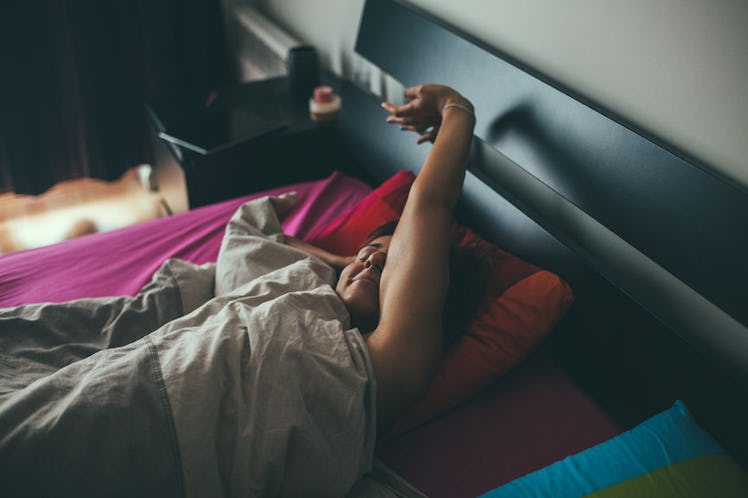
Here's What Experts Want You To Know About How Melatonin Can Affect Your Mental Health
On a night when you're tossing and turning in bed, unable to stop planning your grocery list for the next day or agonizing over an awkward interaction you had with a co-worker, you might find yourself turning to your trusty bottle of melatonin supplements to help your brain quiet down so you can sleep. Hey, whatever gets you those eight hours a night, right? But does regular use of the sleep aid do anything to your brain? If you're wondering how melatonin affects your mental health, you're right to be curious, because according to experts, it can potentially lead to some side effects.
You probably already know that melatonin can help you sleep. What you might not realize is that your brain already naturally produces melatonin. "Melatonin acts on melatonin receptors in the hypothalamus in the brain," explains Jagdish Khubchandani, MBBS, PhD, MPH, an associate professor of health science at Ball State University. But that part of the brain doesn't just influence your sleep, Khubchandani tells Elite Daily. "The hypothalamus is a small, but critical part of the brain, as it regulates sleep, hunger, thirst, emotions, and sex drive, just to name a few," he explains.
So, when you consider all of the other factors that this part of the brain can affect, it becomes clear just how important it is to question how exactly melatonin supplements fit into the bigger picture, outside of how they might influence your sleep schedule.
On one hand, certified mental health professional Adina Mahalli (MSW) says that a sufficient amount of melatonin can have a positive effect on you, because good-quality sleep can certainly support good brain health. "Positive levels of melatonin decrease your chances of having a mental health issue because you’re less sleep-deprived, effectively allowing for optimal brain functioning," she tells Elite Daily.
However, according to licensed psychotherapist Adamaris Mendoza, LPC, MA, things start to get a little trickier when it comes to people who already have, or are prone to, mental health issues. "Even though melatonin has been mostly considered not to have significant toxic effects, mood changes with highs and lows have been reported by users," she tells Elite Daily in an email. "This can cause depression symptoms to worsen."
What's more, Mendoza explains, some connections have been found between the supplement and certain psychotic symptoms, such as hallucinations and paranoia, per Mental Health America. Because of these risks, Mendoza suggests that anyone who has been diagnosed with depression or another psychotic disorder should consult a mental health professional before deciding to self-medicate with melatonin.
If all of this information leaves you worried about how melatonin might affect your brain, remember that you don't have to choose between good-quality sleep and your mental health. You might consider, for instance, taking a smaller dose of the supplement than you usually do. "Some studies suggest that a dose as low as 0.1 to three milligrams is enough for most users to experience results," says Mendoza. You could also opt for a fast-release melatonin option, which could be more effective than a slow-release one.
There are also plenty of natural sleep aids that might work better for your body and mind, without interrupting your nightly snoozing. "If you want to experience the sleep benefits of melatonin, but in a natural way, there are alternatives such as herbal teas like chamomile, valerian root, or magnesium," Mendoza suggests. "Many people are now also using hemp oil and swear by its sleep benefits."
While these alternatives might send you off to a blissful sleep in no time, make sure you also OK them with your doctor, just to be safe.
If you or someone you know is seeking help for mental health concerns, visit the National Alliance on Mental Health (NAMI) website, or call 1-800-950-NAMI(6264). For confidential treatment referrals, visit the Substance Abuse and Mental Health Services Administration (SAMHSA) website, or call the National Helpline at 1-800-662-HELP(4357). In an emergency, contact the National Suicide Prevention Lifeline at 1-800-273-TALK(8255) or call 911.